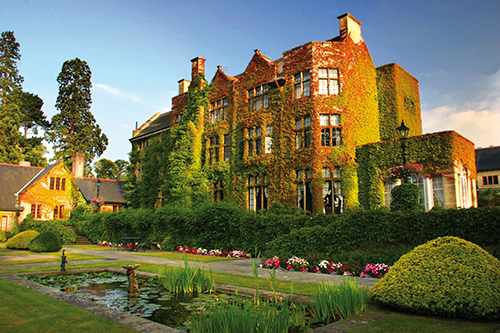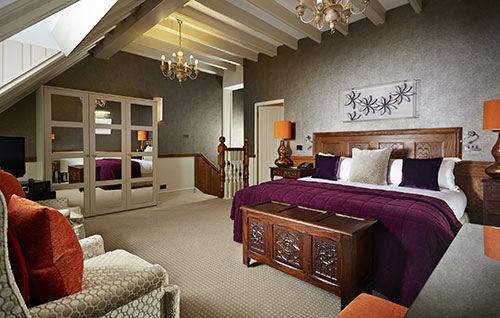Hotels: Walking in your guests' shoes
How often do you review your rooms? Do you think you would notice all the flaws that a guest might see and then share online? Stephanie Sparrow looks at why it is important to be a guest in your own hotel
The question of how much hoteliers understand what it is like to be guest in their own properties was posed recently on The Caterer's Viewpoint page, when Philip Newman-Hall, former managing director of the five-red-AAstar Belmond Le Manoir aux Quat'Saisons, exhorted his peers to pay attention to the "guest experience" and specifically to the perils of design oversight or clumsy service.
Newman-Hall, now a hotel consultant, says that well-planned quality assessment can safeguard the guest experience. He advises that programmes should record, analyse and act upon feedback from different sources.
"You have to look at all the channels of opinion available to you," he says. These channels could include independent research companies, industry bodies, management, staff, guests and guest intelligence software, while incorporating a particular focus from the general manager.
At Exclusive Hotels and Venues, group operations director Julian Tomlin takes multiple perspectives on quality. "At Exclusive we prefer a mix of external and internal assessment methods to ensure we can benchmark against the industry standard, and focus on our own personalised brand standard," he says.
Annual reviews and ad-hoc consultancy projects from the AA are boosted by a mystery guest programme, which measures against Exclusive's manual of 500 quality standards. Tomlin supplements this methodical approach by walking in a guest's shoes: in his other role, as general manager of Exclusive's five-red-AA-star Pennyhill Park, he stays in each of the 123 bedrooms once a year.
"I have other members of the team doing this too," he says, "to ensure we cover all rooms in an organised and frequent process. It includes stretching out in the bath, for example, looking for any blemishes in the paintwork and listening for any noises at night."
Pennyhill Park
Regular assessments
Tomlin advises that regular, rather than one-off assessments, offer the most benefits. "In order to identify trends and create standards upon which you can benchmark year after year, regular and frequent assessments - and ones that really look at the experience from a guest's perspective - are needed."
Software can also be deployed. "With the advent of programmes such as ReviewPro, managers are able to analyse guest feedback in great detail for recurring words that are used, which can help to reinforce best practice or to identify opportunities."
Benchmarking and sharing best practice are some of the benefits from involving established agencies. Consultants Leading Quality Assurance hold global benchmarking data, whereas the AA and the national tourist boards see their inspections as both property specific and appreciative of national trends.
"In these days of user-generated reviews, members and guests know that AA star ratings are judged against fixed quality standards and objectives," says Giovanna Grossi, AA Hotel Services group area manager. "An inspector goes in with a three-star or five-star hat on, and aims to offer a balanced, independent view."
At VisitEngland, the inspector's remit is increasingly about assessing the guest experience, explains head of industry development Pam Foden. She advises that hoteliers can manage guests' expectations by, for instance, listing room sizes on the property's website.
"They could consider how many people are light sleepers and add black-out curtains," she says. "They could also think about soundproofing, which is another important area often mentioned in guest reviews."
Pennyhill Park Begonia suite
Can assessments protect revenue?
As an alternative to hiring industry inspectors, who will offer an overview or consultation, hoteliers should also consider commissioning an independent market research company. At the BDRC Continental consultancy, client services manager Natalie Wiseman gets involved in a range of assignments - "anything from a one-off testing of bed quality to a more regular end-to-end customer journey assessing dozens of intricate brand standards."
Wiseman suggests analysing post-event feedback and using key performance indicators (KPIs) such as a net promoter score (NPS) to predict repeat guests and business growth. A pre-set questionnaire on KPIs and details of the guest's "journey" drive an NPS that is based on the question of "likelihood to recommend", she says. Categorising NPS respondents as 'detractors', mid-scoring 'passives' or high-marking 'promoters' helps distinguish customer groups, and analysing feedback helps to focus on managing each group.
"Hotels need to retain promoters, find out how to 'wow' passives, and fix the issues for detractors," says Wiseman.
At PH Hotels, Joyce Webb, head of quality services, takes a sample of guest feedback on a daily basis to ensure that managers can react immediately to either praise or "react on the spot if we have fallen short".
Ask guests to champion quality
What if your high-marking promoters are so enthusiastic about your brand that they want to help maintain its integrity? This is one of the routes to quality which Silje White, director of quality assurance at Small Luxury Hotels of the World, follows. White has recruited 25 loyal customers (more than 2,000 high net-worth individuals applied) as 'mystery inspectors' to ensure annual inspections of member hotels.
"We need to make sure that hotels meet and exceed certain criteria in terms of quality and high standards to be eligible to be a part of our brand," says White.
The mystery inspectors undertake two-night stays (accommodation is paid for but not travel costs) and write a report from 500 questions.
"They have to look at the convenience of the customer in the room," says White.
Elsewhere, hoteliers are keen to show guests that their opinions count. Mark Ashton, general manager of the four-red-AA-star Aviator hotel in Farnborough, Hampshire, tracks "a fairly scientific loop of feedback" of paper surveys, conversation at checkout and comments on social media. But the hotel has taken another step - a regular guest, who is a technology buff, is reviewing new media systems for the rooms during his weekly stays. "We are delighted to get his comments, and he says he is pleased to give them," says Ashton.
Quality assessment should be seamless, says Debrah Dhugga, managing director of the five red-AA-star Dukes London. Whether this means clear marketing materials to give a "real-life feel for the property", or responding to feedback on room design (Dukes London has Duchess rooms for female travellers) the process should be continuous. "You should never be out of the guests' shoes," says Dhugga.
Rotunda at the Aviator hotel
Which mystery shopper?
David Hopkins, managing director of hospitality customer research company ProInsight, offers advice on how to choose a mystery shopping company:
â- Check that the organisation has signed up to a code of conduct For example, the Market Research Society or the Mystery Shopper Provider Association
â- Speak with some of the organisation's clients Ask for their honest feedback.
â- Be confident that they are measuring your brand, not just that of any hotel or restaurant. The mystery shopping should be built around your business needs.
â- Ask how the mystery shoppers have been trained
How Lucknam Park monitors quality
"We have our own feedback questionnaire but, to be honest, we talk to our guests," says Randall. "We had heard a lot of first-hand comments, such as, 'it would be nice to have a bathroom with a walk-in shower and better lighting', and this was what we have achieved."
Randall reflected on guest feedback and her own preferences for plenty of storage within bathrooms and designed free-standing washstands for the new rooms as a result.
"We wanted bathrooms to be of the moment, but in a classical style," she says, "and guests tell us that they love the new design."
Being attuned to guests' preferences has benefited room rates and staff engagement. "Many of our guests still make reservations by telephone. The newly refurbished bathrooms are discernibly different, which means that they provide an opportunity to sell the rooms in a soft way."
Feedback and her own research facilitated a major change in the bedrooms at the same time. "Electrical sockets have traditionally been kept at a lower level, out of sight, but now guests want to be able to charge their technology and sockets need to be accessible. We have installed more sockets and put them at an easier-to-use height in the rooms."
These are specific examples of how the guest experience is a focus at Lucknam Park, but they are just one part of Randall's approach to quality. She is also informed by quality assurance schemes, consortia requirements, in-house schemes and staff training.
"Externally we are assessed and graded by the AA, VisitEngland, Michelin and Hospitality Assured," says Randall, "additionally, inspectors from Relais & ChÁ¢teaux and Pride of Britain come as anonymous guests, writing a report afterwards. Other kinds of objective assessment include regional tourism awards.
"The advantage of being quality assessed is that these organisations work to precise and specific benchmarked standards, which are published. It means that we are receiving structured feedback from trained assessors and inspectors who are out in the industry, observing the trends and standards."
These quality schemes are recognised nationally and internationally, which is not only good for business, but recruitment too. "Symbols of quality, such as Michelin's four red hotel turrets awarded to Lucknam, are recognised by guests both here and abroad," says Randall.
Lucknam Park
"Chefs come to us because we have a Michelin-starred restaurant. Staff view awards and schemes as a sign of quality endorsement, and we find that some staff like to develop their careers by gaining experience in recognised, award-winning properties.
"We have an internal scheme in place called Incentive Stays, a benefit which allows staff and their families to experience Lucknam from a guest perspective," she says. "I also encourage staff to stay in other hotels. We receive preferential rates at other members of Relais & ChÁ¢teaux and Pride of Britain, and I ask staff to complete one of our forms when they return, to suggest ideas that might be suitable for us."
A six-year career as an inspector for the Michelin Guide Great Britain and Ireland has given Randall an objective and balanced approach to quality initiatives, which she expects to be ingrained within the hotel - not staged for an inspector's visit.
"We have 150 staff for 42 rooms. We constantly monitor standards and give praise where it is due, as well as training where necessary to maintain the hotel's standards. One of the successes of Lucknam Park is about creating a culture where pride in performance is key," she says.
Lucknam Park
Contacts
Quality assessment programmes
Leading Quality Assurance
BDRC Continental
Guest intelligence software and satisfaction surveys
ReviewPro Europe
Formal accreditation programme
Hospitality Assured
Hospitality Assured is the standard for service and business excellence created and licensed by the Institute of Hospitality
Mystery Shoppers
ProInsight
The Secret Hotel Inspector
Looking for a job? See all the current hotel vacancies available with The Caterer Jobs >>
Latest video from The Caterer
Continue reading
You need to be a premium member to view this. Subscribe from just 99p per week.
Already subscribed? Log In
















